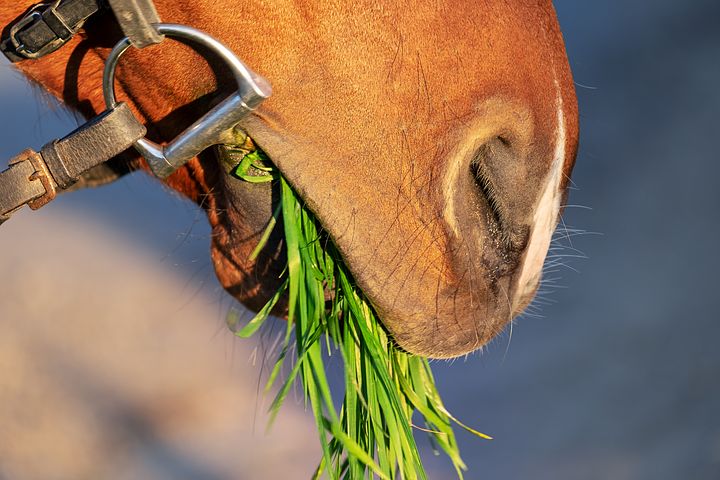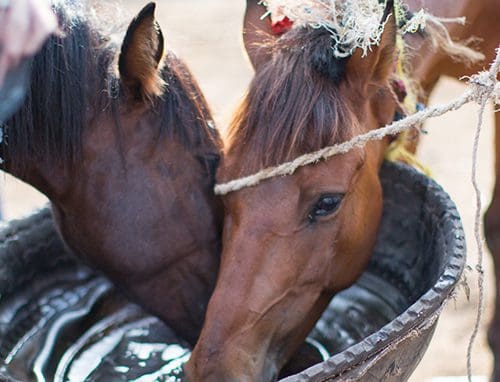Horses eat grass, hay, and grains. Horses have specific dietary needs to ensure their overall health and well-being.
While they are herbivores, their main diet consists of grass or hay, which provides necessary nutrients. Good-quality hay should be provided to horses daily, as it contains essential fiber for proper digestion. Additionally, oats or barley can be given in moderation for extra energy and nutrients.
It’s important to note that the quantity and type of food horses require can vary based on factors like age, weight, and activity level. Understanding and providing the appropriate diet for horses is essential for their overall health and performance. Horse owners can ensure their equine companions lead happy and healthy lives by meeting their nutritional needs.
What Do Horses Eat For Optimal Health?
The role of forage in equine nutrition is crucial. Horses are natural grazers and thrive on a diet primarily consisting of forage, such as hay or pasture grass. Forage provides essential fiber and helps maintain a healthy digestive system. It also promotes natural chewing and saliva production, aiding nutrient absorption.
The balance of grains and concentrates must be carefully considered in addition to forage. These provide additional nutrients, including protein, vitamins, and minerals, but should be fed in moderation. Too many grains or concentrates can lead to weight gain, digestive issues, and metabolic disorders.
Lastly, providing clean, fresh water is vital for a horse’s health. Horses require significant water daily to aid digestion and prevent dehydration. It’s important to regularly check and refill water sources to ensure horses have access to clean water.
Equine Dietary Needs Across Life Stages
Equine dietary needs vary across different life stages. Regarding growing foals, their nutritional demands differ from those of adult horses. Foals require a diet of essential nutrients to support their rapid growth and development. Adequate protein, vitamins, and minerals are crucial for their optimal growth.
Adult horses, on the other hand, have different dietary requirements. Their maintenance diet should consist of a balance between forage and concentrate. High-quality hay or pasture provides necessary fibers, while concentrates meet their additional energy and nutrient needs. To maintain optimal health, it’s important to adjust the feed according to each horse’s activity level and body condition.
As horses age, their dietary needs change. Senior horses may face challenges properly digesting and utilizing nutrients from their feed. Their diet needs to be adjusted to promote healthy aging and manage weight. Including easily digestible, highly palatable feed and providing additional forage can help meet their specific nutritional needs.
Specialized Horse Diets For Specific Needs
Horses, like humans, have specific dietary needs based on individual factors. One important aspect of managing horse nutrition is modifying their diet to maintain appropriate weight. Changing their diet can be beneficial for horses that struggle with weight issues. Modifying the feeding routine by reducing the amount of grain or concentrate and increasing the intake of forage can help manage weight effectively.
Feeding horses with dental or digestive issues requires special attention. In such cases, providing an easy chew diet is essential. Soaking the feed or offering wetted hay can aid digestion, ensuring adequate nutrient absorption. Additionally, ensuring enough fiber intake can support healthy gut function.
Performance horses have unique nutritional requirements to perform optimally. Their diet should be high in energy, protein, vitamins, and minerals to meet the demands of strenuous exercise. Feeding strategies may include providing smaller, more frequent meals to optimize nutrient absorption and minimize digestive issues.
Debunking Equine Diet Myths
Many people have misconceptions about what horses eat and how to feed them properly. One common myth is that horses need a constant supply of hay. While hay is an important part of a horse’s diet, it should not be the sole source of nutrition. Horses also require a balanced diet that includes grains, fruits, and vegetables.
Another misconception is that dietary supplements are necessary for a horse’s health. While some supplements can be beneficial, they should only be used under the guidance of a veterinarian. It’s important to remember that supplements cannot replace a healthy diet.
Horses also require salts and minerals in their diet. Contrary to popular belief, horses do not need a salt block in their stalls. Instead, they should have access to a proper mineral supplement that contains the necessary salts and minerals.
| Common Myths | The Truth |
|---|---|
|
|
|
|
|
|
Safe Foods And Toxic Plants For Horses
Safe Foods and Toxic Plants for Horses
Proper nutrition is essential for horses’ health and well-being. When it comes to identifying safe treats and snacks for horses, it’s important to be aware of the foods they can and cannot eat. Horses have a unique digestive system, so it’s vital to ensure their food is safe and suitable for their dietary needs.
Safe treats for horses include carrots, apples, and bananas. These foods are not only a healthy option, but they also provide horses with essential vitamins and minerals. However, certain plants and foods can be toxic to horses and should be avoided. Examples of toxic plants for horses include bracken fern, yew, and ragwort. These plants can cause serious health issues and even be deadly if ingested by horses.
If you are unsure about the safety of a particular food or plant, it’s always best to consult with a veterinarian or equine nutritionist. They can provide expert guidance on what foods are safe for horses to eat and help prevent any potential health problems that may arise from feeding horses unsafe foods or allowing them access to toxic plants. By being knowledgeable about safe foods and aware of toxic plants, horse owners can ensure their beloved equines receive the proper nutrition they need to thrive.
Seasonal Adjustments In Horse Feeding
When it comes to winter feeding strategies for keeping horses healthy, ensuring they have a balanced diet that meets their nutritional needs is crucial. In cold weather, horses require extra calories to maintain their body temperature. Providing good quality forage such as hay or pasture is essential, as it helps generate heat during digestion. Additionally, summer diet adjustments are also important for hydration and energy. During hot weather, horses need increased water intake to prevent dehydration. Adding electrolytes to their diet can help replenish minerals lost through sweating.
Horses have specific dietary requirements that vary by season, and it is important to adjust their feeding regimen accordingly. Incorporating these seasonal adjustments into a horse’s diet can improve their health and well-being.
Monitoring Horse Health Through Diet
A well-balanced diet is essential for maintaining a horse’s overall health. Ensuring that your horse receives proper nutrition can help prevent various health issues and ensure their vitality. One sign of a well-balanced horse diet is a healthy and glossy coat. Horses with balanced diets generally have vibrant, shiny coats that indicate good overall health. Another important sign to look for is strong hooves. Adequate nutrition plays a vital role in maintaining hoof health, so if your horse has strong and sturdy hooves, it is a good indication that their diet is well-balanced.
On the other hand, horses with dietary deficiencies may exhibit certain symptoms that indicate the need for dietary adjustments. For instance, if a horse’s coat appears dull and lacks luster, it could be a sign that they are deficient in essential nutrients. Similarly, weak and brittle hooves can also indicate an inadequate diet. If you notice any of these symptoms or have concerns about your horse’s diet, it is important to consult a vet. They can provide expert advice and recommend suitable dietary changes to ensure your horse’s optimal health.
Practical Tips For Feeding Horses
Horses have specific dietary needs, and providing them with a balanced and nutritious diet is important. They primarily eat hay, grass, and grains. It is crucial to consult with a veterinarian or equine nutritionist to determine the specific dietary requirements of your horse and ensure they are receiving the proper nutrients.
- Feeding horses requires careful planning and consideration. One important aspect is scheduling feeding times. Horses should be fed consistently daily to establish a routine and prevent hunger or digestive issues.
- When transitioning horse feeds, it is crucial to do so gradually. Abrupt changes can upset their digestive system and lead to colic or other health problems. Introduce new feeds slowly over several days or weeks, gradually increasing the amount while reducing the old feed. This allows the horse’s body to adapt to the changes.
- Measuring and weighing horse feed accurately ensures the horse receives the correct nutrition and avoids overfeeding or underfeeding. Invest in a scale or use a measuring cup to measure the feed precisely. Follow the recommended feeding guidelines the feed manufacturer provides to ensure the horse’s nutritional needs are met.
Sustainable Horse Feeding Practices
Sustainable horse-feeding practices promote equine health and contribute to a healthier environment. One key aspect of sustainable feeding is the utilization of locally sourced horse feed. By selecting feed ingredients produced locally, horse owners can reduce the carbon footprint associated with transportation and support local agriculture.
Locally sourced horse feed offers several benefits. First, it ensures fresher and more nutritious feed for horses, which contributes to better digestion and overall health. Second, supporting local farms and businesses helps to stimulate the local economy. This is particularly important for rural areas that often rely on agriculture.
Additionally, relying on local sources for horse feed can reduce the risk of contamination and quality control issues. By knowing the source of the feed ingredients, horse owners can have greater confidence in the feed’s safety and nutritional value.
In conclusion, sustainable horse feeding practices are vital in maintaining equine health and preserving the environment. By prioritizing locally sourced horse feed, horse owners can promote their animals’ well-being while supporting the local economy and reducing their environmental impact.

Credit: www.primestables.co.uk
Frequently Asked Questions For What Do Horses Eat
What Food Do Horses Eat?
Horses eat hay, grass, grains, and fresh fruits and vegetables. They also require constant access to clean water.
Do Horses Ever Eat Meat?
No, horses do not eat meat. They are herbivores and primarily consume grass, hay, and other plant materials.
What Is The Basic Feed For A Horse?
A horse’s basic feed consists of grass, hay, and grains, which provide the necessary nutrients for its daily needs.
What Did Horses Originally Eat?
Horses originally ate grass and other vegetation as their main source of food.
Conclusion
Understanding horses’ dietary needs is crucial in ensuring their overall health and well-being. A balanced diet consisting of forage, grains, and supplements can help horses maintain a healthy weight and receive essential nutrients. By carefully monitoring their feed intake and consulting with a veterinarian or equine nutritionist, horse owners can help prevent digestive issues and promote optimal health for their equine companions.
Remember, a well-nourished horse is a happy and thriving horse.

